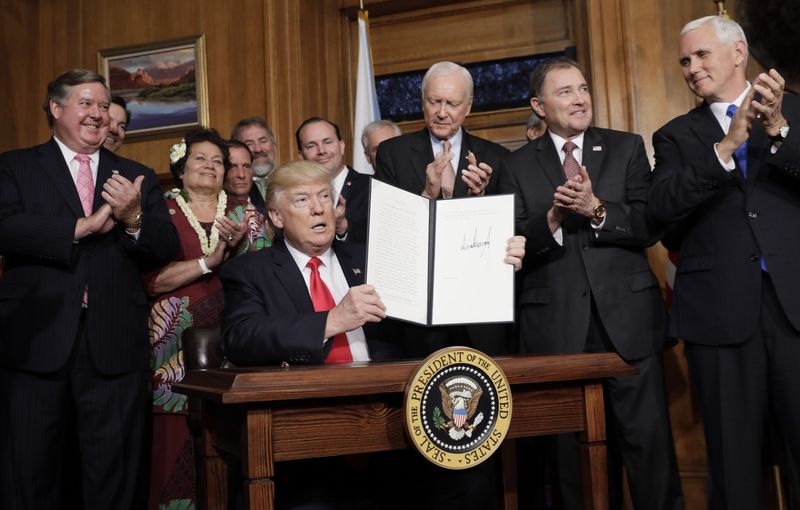By Valerie Volcovici
WASHINGTON (Reuters) - U.S. President Donald Trump signed an executive order on Wednesday to identify national monuments that can be rescinded or resized - part of a broader push to open up more federal lands to drilling, mining and other development.
The move comes as part of Trump's effort to reverse a slew of environmental protections ushered in by his predecessor, Democratic President Barack Obama, that he said were hobbling economic growth, an agenda that is cheering industry but enraging conservationists.
The Republican president signed the order at the Interior Department in Washington, saying that Obama's use of the 1906 Antiquities Act to create monuments marked an "egregious abuse of federal power" allowing the federal government to "lock up" millions of acres of land and water.
"Today we're putting the states back in charge," Trump said, saying they should decide what areas of land should be protected and which should remain open for development.
The monuments covered by the review will range from the Grand Staircase created by President Bill Clinton in 1996 to the Bears Ears created by Obama in December 2016, both in Utah.
Interior Secretary Ryan Zinke told reporters late on Tuesday that Trump's order would require him to conduct the review of around 30 national monuments created over the past two decades, and recommend which designations should be lifted or altered.
Zinke said he would seek local feedback before making his recommendations, and added that any move by Trump to ultimately reverse a monument designation could be tricky.
"It is untested, as you know, whether the president can do that," Zinke said.
Legal challenges are expected because no president has ever rescinded a monument designation.
President Woodrow Wilson reduced the size of Washington state's Mount Olympus National Monument in 1915, arguing there was an urgent need for timber at the time, one of the few examples of the size of national monuments being changed.
Zinke will review the Bears Ears monument first, he said, and will make a recommendation to the president in 45 days. He has 120 days to issue a full report on all monuments to the president.
Obama created the Bears Ears monument in the final days of his administration, arguing that it would protect the cultural legacy of Native American tribes and preserve "scenic and historic landscapes."
But Utah's governor and the state's congressional delegation opposed the designation, saying it went against the wishes of citizens eager for development.
Utah Governor Gary Herbert, and Senators Mike Lee and Orin Hatch, all Republicans, stood beside Trump as he signed the order. Trump said the lawmakers actively lobbied him for the order.
The Bears Ears area lies near where Texas-based EOG Resources Inc (NYSE:EOG) had been approved to drill.
Republican House of Representatives Speaker Paul Ryan praised the order.
"I commend the Trump administration for stopping this cycle of executive abuse and beginning a review of past designations," he said.
Conservation and tribal groups criticized the order.
"With this review, the Trump Administration is walking into a legal, political and moral minefield," said Kate Kelly, public lands director for the Centre for American Progress.
Democratic Congressman Raul Grijalva of Arizona, ranking member of the House natural resources committee, warned Zinke not to make an "ideological" decision, adding that previous monuments were done "after years of close federal consultation with multiple local stakeholders."
The Outdoor Industry Association, the trade group of the recreation industry, also attacked the order. Zinke spoke at the launch of the group's report, which said the outdoor recreation economy generates over $887 billion in consumer spending and creates 7.6 million jobs.

"Less than 24 hours after joining with our industry to celebrate the economic power of outdoor recreation, in a hypocritical move, the Trump administration took unprecedented steps that could result in the removal of protections for treasured public lands," said Rose Marcario, chief executive of outdoor gear retailer Patagonia.